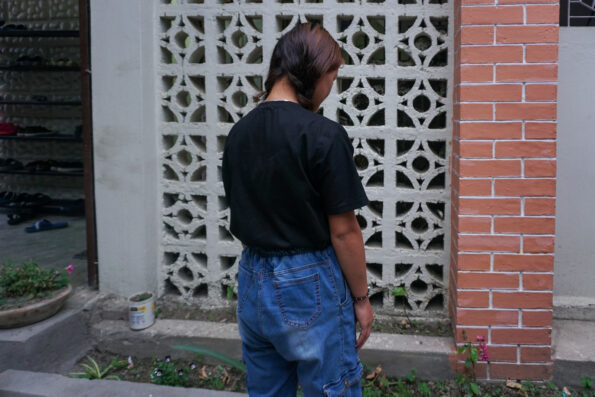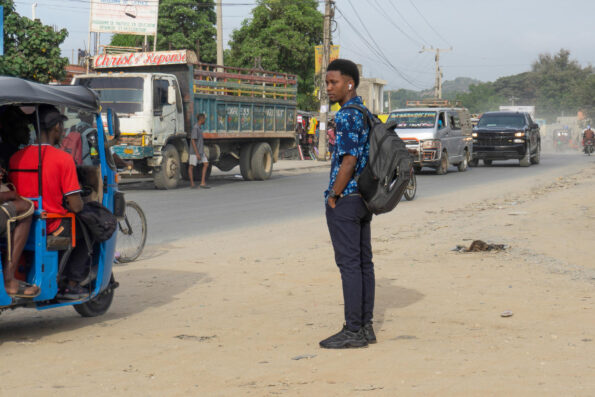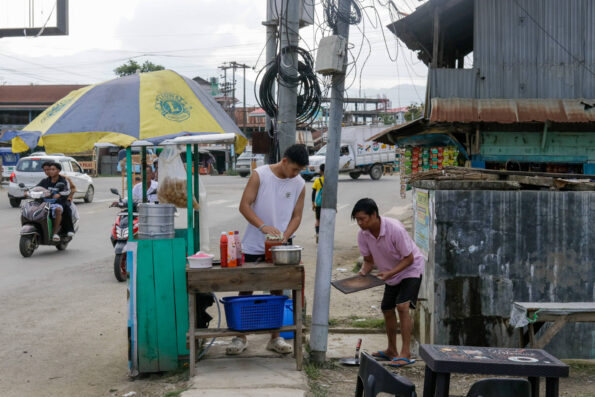
MERVEILLE KAVIRA LUNEGHE, GPJ Democratic Republic of Congo
A veranda, a traditional Nande structure, still guards the entrance to Ruvugha, even though most of the village’s population has fled the area due to armed bandits.
KIRUMBA, DEMOCRATIC REPUBLIC OF CONGO — The structure is deceptively simple: a round, mud-plastered hut with a thatched roof and two open doorways.
But to the Nande, the largest tribe in North Kivu, a province of 7.1 million people on the country’s eastern border, this “veranda” at every village entrance once offered protection from all kinds of dangers: war, drought, theft, disease and witchcraft. At dusk and other designated times, men and boys would gather there to welcome visitors, resolve conflicts and perform secret rites to ward off evil.
“Our customs had a lot of power,” says Kambale Kifuli Twamutegha, 60, a Nande tribal leader. “Because of the neglect of the verandas, North Kivu in particular and the Democratic Republic of Congo in general are now plagued by insecurity.”
After surviving centuries of brutality, including the Atlantic slave trade and Belgian colonization periods, the Nande way of life now faces a serious menace from within: Entire families are abandoning their ancestral homes for the relative safety and security of city life. By saving themselves, these fleeing civilians leave the region even more vulnerable to armed violence, their elders warn — destabilizing the country by discarding their traditions.
“We are now shaking in the wind,” says Paluku Muzehe, 57, a blacksmith in the village of Kirumba, south of Lubero.



Cities may offer greater distance and anonymity from the armed factions clashing across the region — and provide modern education and livelihood opportunities — but Nande elders insist their peoples’ survival depends on returning to their villages and customs, starting with the veranda rites. Without this physical place to unite them, they say, the Nande have become scattered, their cultural heritage endangered.
“Families that were united in the village were separated,” says Kitsongo Wambeho King, 62, who leads cultural preservation efforts at Kyaghanda Yira, a tribal association based in North Kivu. “You won’t see old people sitting anywhere anymore. This is a weakness with many consequences.”
In urban areas with significant Nande populations, some neighborhoods have erected veranda-like structures, but they tend to be used for rest and recreation. Mbusa Kasika Marumba, 58, coordinator of the Association of Land Chiefs on the Western Shore of Lake Edward, says that in his youth, a village’s veranda served a much higher purpose.
“It was like a school or a church,” he says. “Wise men came to find solutions to the major problems of the population.”
According to Nande folklore, protection ceremonies performed by men and boys in the verandas can ward off invaders by mystically disguising a village as a lake, or sending attackers in the wrong direction, or plaguing them with bees and ants.
“At present, the enemy penetrates easily because the rites that used to be performed are no longer carried out,” says Muhindo Kataliko, 52, a farmer in Kirumba.
Some young people who have never experienced an authentic veranda ceremony say they feel their lives are missing the kind of physical and spiritual connections described by their fathers and grandfathers.
“My parents often tell me that the veranda was very much involved in the defense of our tribe. Our custom has its powers,” says Julson Kayenga, 24, a field worker in Kirumba. “I wish that the verandas would come back so that our forces of the past would return to us and insecurity would be eradicated.”
Not everyone is so eager to return to the old ways. Traditional Nande women and girls prefer to avoid expressing opinions on customs that didn’t involve them. Members of the community who have embraced Christianity, the majority faith in DRC, say that veranda culture conflicts with their religious beliefs.
“Jesus Christ is the only security,” says Jones Kavira, 55, a Nande woman and Catholic nun. “In case of difficulties, we must call on his name and he will act. He gives us peace. Verandas cannot do anything.”
The influence of Christianity, introduced by missionaries during the Belgian colonial period between 1885 and 1960, has been the most consistent threat to veranda culture, King and Marumba agree.
“The fight against the verandas began during the colonization,” King says. “To better dominate us, the colonizers forced us to abandon our God to follow theirs. With the arrival of their religion, they divided us. The Belgians made us believe that the power we had was satanic. And yet, it was God himself who had given it to us.”
The Nande leaders pushing for a return to the verandas are all men over the age of 50. While it has long been the role of male elders to decide what’s best for the community, if younger generations are not swayed this time, Marumba says, their cause may be lost.
“Let the old people take their culture back by thinking about verandas again,” he says, “but it is necessary that they also involve the young people in the matter.”
Merveille Kavira Luneghe is a Global Press Journal reporter based in Kirumba, Democratic Republic of Congo.
TRANSLATION NOTE
Megan Spada, GPJ, translated this story from French.








